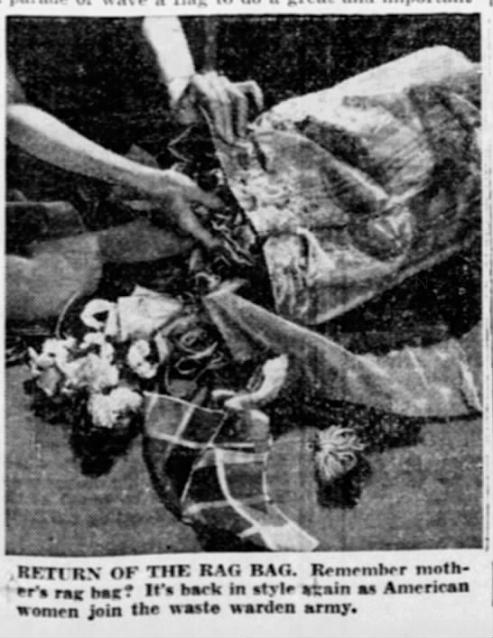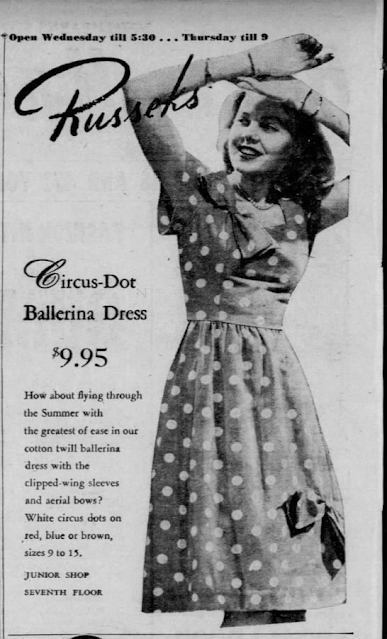My family used to joke about all the "stuff" that my maternal grandparents saved. They saved everything--I remember when my uncle was building his house, my grandfather used to check the lot for nails the workmen dropped. Although the first floor of their house was always neat and tidy, by the time my grandfather passed and my grandmother moved to a nursing home, the basement was so full that one had to move between thin aisles to each basement section.
Chances are, if you are lucky enough to have family members in their 90s, you may have witnessed something similar. There are always exceptions--like my paternal grandparents who's basement and even garage were spotless and clutter-free.
We've always attributed this characteristic to the fact that these folks grew up during the Depression. But I think there is another reason. Many folks (world-wide) went from the Depression into World War 2. The war meant rationing and that many items were scarce, including food. In Britain, Canada, and the U.S., abiding by rations and saving scrap was a patriotic duty. Everyone for the most part wanted to do something to help "save the boys."
In the U.S., a phrase was repeated throughout the war: Waste Wardens.
These drives weren't just about saving metal, paper, or following rationing rules. A lot fell particularly on women who were expected to work, raise their family, and practice a frugal economy in the home.

But my favorite pieces were tips published that promoted how women could alter their wardrobes. Some of these were sponsored by manufacturers--like this ad from a dress shield company. Still there were many good tips like how to "prolong her wardrobe's life":
Here are some of the other tips:
Upcycle old dresses:
Use every bit of lipstick!
Return to Mama's Rag Bag:
Other tips included:
*Covering your quilt with cheesecloth (like a duvet) in order to lengthen the lifetime of the textile.
*Give dresses a gay new look with appliqued fabric on the waist, hem, or shoulder. "Cut print appliques from a scarf, a blouse, or another old dress."
*Use lace or rickrack to enhance your wardrobe. The article mentions that there are 11 sizes of rickrack!
*Remove old zippers from worn clothing to reuse.
*Cut up your old evening dress of taffeta to make a ballerina dress for your daughter. I wasn't sure what a ballerina dress was but found some examples. They all look different to me but maybe the description implies the full skirt?
The boxes of donated fabric and sewing notions now make more sense to me. Coming out of The Depression was a way of survival; frugality during wartime contributed to the effort. By the time the war was over, saving was a part of the psyche of the now 90s aged folks.
I hope you enjoyed this look at Waste Wardens! Tomorrow is Flower Friday and if you have anything to share, please email me at allentownquilter@gmail.com!
Have a safe and happy day!












I've never heard the term Waste Warden. But, being raised by parents from the generation you are talking about, we learned to save things and reuse them. When I was first married we were on quite a tight budget an I remember remaking things as the kids grew. My father-in-law was quite a saver with a whole machine shop behind his house. His four sons were delighted with the machinery that was left to them but not the boxes, bins, and cans of miscellaneous nails and screws.
ReplyDeleteI thoroughly enjoyed this post, Michele. How interesting to consider those events and the effect they had on the every day lives of everyone. It reminds me of my older grandparents who saved string and brown paper. Tony who is 83 now doesn't throw out a thing...I've had to learn to accept it really. But being British, he was raised to be very careful and frugal. I've never heard of this term, Waste Warden. Fascinating as now we have gone too far the other way as a society.
ReplyDeleteWhen we were kids and going to throw something out, our parents would say, "That's going to look pretty 'darn' good to you some day when you don't have anything." I particularly remember this comment when I was about to throw out two jelly jars, which we used for drinking glasses, because they were stuck together and I didn't want nt to cut myself trying to separate them.
ReplyDelete